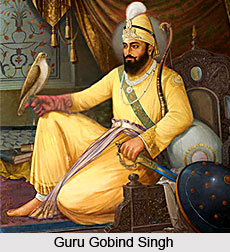 Military administration under Sikhs was under the in charge of Finance Minister. As the army had increased to fairly large proportions it needed a minister for its administration. A Finance Minister was, therefore, appointed to ensure that pay was disbursed to the troops regularly and men handled with care. It is said that on one occasion the troops clamoured for their pay as it was long overdue. Relief arrived in the form of a devout Sikh who offered a large amount of money to the guru. The Sikh Army also included several Muslim soldiers. Their pay was fixed at rupees five per day for every officer and one rupee a day for every soldier. Before the start of a campaign provisions were always collected and properly stored. Their issue was strictly controlled.
Military administration under Sikhs was under the in charge of Finance Minister. As the army had increased to fairly large proportions it needed a minister for its administration. A Finance Minister was, therefore, appointed to ensure that pay was disbursed to the troops regularly and men handled with care. It is said that on one occasion the troops clamoured for their pay as it was long overdue. Relief arrived in the form of a devout Sikh who offered a large amount of money to the guru. The Sikh Army also included several Muslim soldiers. Their pay was fixed at rupees five per day for every officer and one rupee a day for every soldier. Before the start of a campaign provisions were always collected and properly stored. Their issue was strictly controlled.
The intelligence system was perfected in the military administration under Sikhs and scouts were always sent ahead to find out detailed information about the enemy. The old practice of giving immediate awards on the battle-field on acknowledgement of outstanding gallantry and bravery was revived. Further, drums were also introduced as an accompaniment to the armies and used with great effect to warn and collect the followers and a signal for all to take up arms. In accordance with the age-old custom martial songs were sung before a battle so that even the hearts of cowards may be inspired and enthused. Educated persons were employed to translate the holy books and recite the stories of famous fighters. The Sikhs made a great show of armed might twice a year.
The army organisation under the Sikhs was known for setting about all the tasks in a most methodical manner. Guru Gobind Singh, from the time he emerged from his self-imposed retirement, spent most of the time on campaigns. Realising their military importance, forts were established at the foot-hills between the Jhelum River and Sutlej River. These were meant to secure the Sikhs against the Hindu rajas of the hills who did not like their rising influence. These rajas fought singly or in combination and sided with the Imperial forces in all the campaigns against the Sikhs. More than once the Sikhs routed superior armies set against them. After some heavy fighting, he was forced to evacuate the town and he retired north with some of his trusted followers. He retrieved the lost ground soon after by defeating the hill chiefs. After the death of Aurangzeb in 1707 his son followed a policy of reconciliation towards the Sikhs.




















